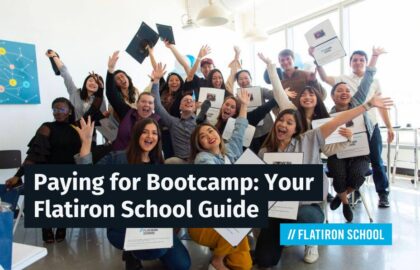This article on interview questions is part of the Coaching Collective series, featuring tips and expertise from Flatiron School Career Coaches. Every Flatiron School graduate is eligible to receive up to 180 days of 1:1 career coaching with one of our professional coaches. This series is a glimpse of the expertise you can access during career coaching at Flatiron School.
As a career coach, I spend a lot of time with job seekers on interview prep.
It often baffles me when, at the end of a mock interview session, many job seekers have no questions prepared. And, when they have questions, these are often poorly crafted that add little-to-no value to the conversation or their candidacy for the role.
Yet, asking questions during an interview is very important for a candidate. Having questions not only shows that the candidate is interested in the job. It also provides opportunities for the candidate to learn more about the role and the company and build rapport with the interviewer, while assessing if the role is a good fit for them.
In short, asking questions is a key step of the interview that the candidate should not overlook and must prepare for. Not doing so could jeopardize their chances of advancing to the next stage in the interview process, regardless of how well-qualified they may be for the job.
Why Some Don’t Ask Questions
In my experience, candidates asking no or poor questions during an interview is often because of the following:
- They don’t have a lot of experience interviewing
- They don’t know what questions to ask, and hence have “no questions”
- They don’t understand the value of asking questions during an interview
The good news is that all of this can be mastered with preparation and practice.
Hence, the objective of this blog is to prepare job seekers not only to ask questions but to ask good questions: Open-ended questions that further engage the interviewer in conversation, allowing the candidate to unearth important details, challenges, and opportunities about the role. Ultimately, good questions increase the candidate’s chances to move to the next step in the process and empower the candidate to assess their fit for the role and company they’re interviewing for.
Below are a few tips for asking good questions during an interview:
Craft Your Own Questions
You will find many ”frequently asked interview questions” on a simple Google search. While you may be tempted to use these in your next interview, crafting your own will yield better results.
For instance, a typical question on these templates is “what does a typical day look like in this role?”, a general inquiry that may send the interviewer in any direction in their answer, giving you an answer not useful to you.
Rather, you may ask, ”I know that the main functions of this role are XYZ. Will you please tell me more about what X looks like on a typical day?”
The latter shows that you understand the job’s key functions, demonstrating that you’ve done your homework. Because of the specificity of your inquiry, the interviewer may provide information not readily available online or the job description to help you further discern the job and set you up for success.
If using a template, reference it for ideas of types of questions to ask.
Use Questions To Show Off Soft Skills
According to a study in 2016, 93% of employers term soft skills, or interpersonal skills, as either “very important” or “essential.
Soft skills are assessed throughout the interview, but your questions – what you inquire about, the framing, and the overall quality of your questions – are unique opportunities to further showcase them.
For instance, asking questions that reveal new aspects of the role demonstrates creativity and problem-solving. Or, perhaps you refer to something your interviewer mentioned, exhibiting strong attention to detail and active listening.
Interviewers often leave very little time for candidates to ask questions. This challenges you to prioritize what questions to ask and how to ask them.
End With A Positive Impression
You may ask follow-up/clarifying questions during the interview if you must, but the interview format determines when it is your turn to ask questions.
Use this time wisely to wrap up the interview and leave a positive lasting impression. Here are some tips:
- Show your preparedness by having a list of questions readily available. The rule of thumb is to have 3-5 questions, though the focus should be on quality versus quantity.
- Ask about the next steps and know when the interviewer will follow up. This will keep you from wondering, and you’ll know when to follow up with the interviewer.
- Close the meeting by reiterating your interest in the role, and thank the interviewer for their time.
About Junior Manon
Junior Manon is a College Access and Success and Career Development professional with over fifteen years of experience. He currently works as an independent consultant and career coach, helping organizations develop opportunities and support for people of color to break into, and succeed, in tech industries.




